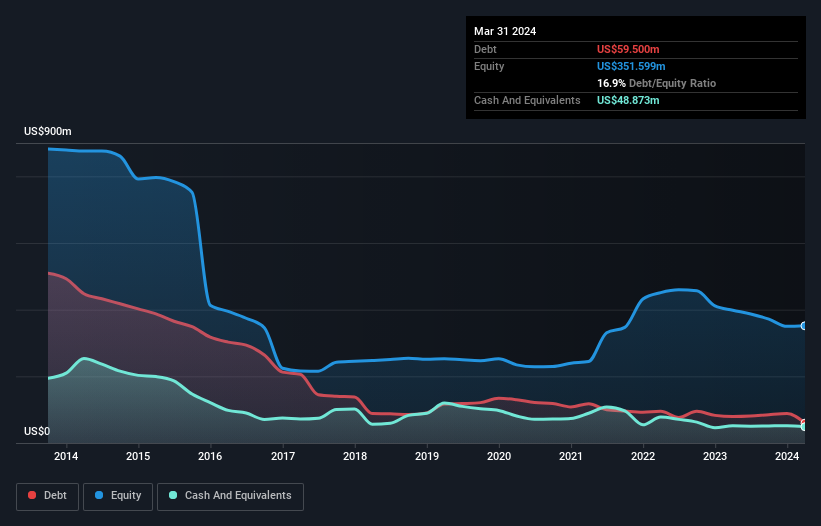
David Iben put it well when he said, 'Volatility is not a risk we care about. What we care about is avoiding the permanent loss of capital.' So it might be obvious that you need to consider debt, when you think about how risky any given stock is, because too much debt can sink a company. As with many other companies Jinhui Shipping and Transportation Limited (OB:JIN) makes use of debt. But the more important question is: how much risk is that debt creating?
When Is Debt A Problem?
Debt and other liabilities become risky for a business when it cannot easily fulfill those obligations, either with free cash flow or by raising capital at an attractive price. Ultimately, if the company can't fulfill its legal obligations to repay debt, shareholders could walk away with nothing. However, a more frequent (but still costly) occurrence is where a company must issue shares at bargain-basement prices, permanently diluting shareholders, just to shore up its balance sheet. Having said that, the most common situation is where a company manages its debt reasonably well - and to its own advantage. When we examine debt levels, we first consider both cash and debt levels, together.
See our latest analysis for Jinhui Shipping and Transportation
How Much Debt Does Jinhui Shipping and Transportation Carry?
The image below, which you can click on for greater detail, shows that Jinhui Shipping and Transportation had debt of US$59.5m at the end of March 2024, a reduction from US$79.4m over a year. However, it also had US$48.9m in cash, and so its net debt is US$10.6m.

How Strong Is Jinhui Shipping and Transportation's Balance Sheet?
According to the last reported balance sheet, Jinhui Shipping and Transportation had liabilities of US$32.9m due within 12 months, and liabilities of US$75.5m due beyond 12 months. Offsetting this, it had US$48.9m in cash and US$14.8m in receivables that were due within 12 months. So its liabilities total US$44.7m more than the combination of its cash and short-term receivables.
This is a mountain of leverage relative to its market capitalization of US$59.9m. This suggests shareholders would be heavily diluted if the company needed to shore up its balance sheet in a hurry. There's no doubt that we learn most about debt from the balance sheet. But it is Jinhui Shipping and Transportation's earnings that will influence how the balance sheet holds up in the future. So if you're keen to discover more about its earnings, it might be worth checking out this graph of its long term earnings trend.
Over 12 months, Jinhui Shipping and Transportation made a loss at the EBIT level, and saw its revenue drop to US$95m, which is a fall of 29%. That makes us nervous, to say the least.
Caveat Emptor
While Jinhui Shipping and Transportation's falling revenue is about as heartwarming as a wet blanket, arguably its earnings before interest and tax (EBIT) loss is even less appealing. Its EBIT loss was a whopping US$11m. Considering that alongside the liabilities mentioned above does not give us much confidence that company should be using so much debt. So we think its balance sheet is a little strained, though not beyond repair. Another cause for caution is that is bled US$2.3m in negative free cash flow over the last twelve months. So to be blunt we think it is risky. The balance sheet is clearly the area to focus on when you are analysing debt. But ultimately, every company can contain risks that exist outside of the balance sheet. Case in point: We've spotted 2 warning signs for Jinhui Shipping and Transportation you should be aware of, and 1 of them can't be ignored.
Of course, if you're the type of investor who prefers buying stocks without the burden of debt, then don't hesitate to discover our exclusive list of net cash growth stocks, today.
New: Manage All Your Stock Portfolios in One Place
We've created the ultimate portfolio companion for stock investors, and it's free.
• Connect an unlimited number of Portfolios and see your total in one currency
• Be alerted to new Warning Signs or Risks via email or mobile
• Track the Fair Value of your stocks
Have feedback on this article? Concerned about the content? Get in touch with us directly. Alternatively, email editorial-team (at) simplywallst.com.
This article by Simply Wall St is general in nature. We provide commentary based on historical data and analyst forecasts only using an unbiased methodology and our articles are not intended to be financial advice. It does not constitute a recommendation to buy or sell any stock, and does not take account of your objectives, or your financial situation. We aim to bring you long-term focused analysis driven by fundamental data. Note that our analysis may not factor in the latest price-sensitive company announcements or qualitative material. Simply Wall St has no position in any stocks mentioned.
Have feedback on this article? Concerned about the content? Get in touch with us directly. Alternatively, email editorial-team@simplywallst.com
About OB:JIN
Jinhui Shipping and Transportation
An investment holding company, engages in ship chartering and owning activities internationally.
Excellent balance sheet with acceptable track record.
Market Insights
Community Narratives



